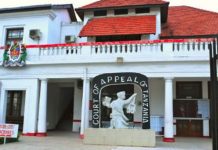THE Court of Appeal has confirmed the death sentence on Ruangwa District resident Emmanuel Yasipati, over the murder of his neighbour, Christian Kiliani, whom he suspected of stealing sunflower heads from his farm .
Justices Augustine Mwarija, Richard Mziray and Ferdinand Wambali ruled against Yasipati, the appellant, after dismissing the appeal he had filed to challenge the findings of the High Court.
They said that since the appellant had admitted having wounded the deceased by cutting him on the head with a machete before he went with him to the village authorities, the circumstances were with effect that he could not be disassociated with the deceased’s death.
According to the justices, the postmortem report shows that the deceased had big cut wounds on the head and both shoulders and the cause of death was brain damage and bleeding.
“Taking into consideration all the above factors leading to the death of the deceased, drawing of an inference that it was the appellant who murdered the deceased is irresistible.
For the above reasons, we do not find merit in the appeal. The same is hereby dismissed,” they declared. The justices explained that it was indisputable the appellant was the last person to be seen with the deceased.
For that reason, they said, in the absence of plausible explanation regarding the death of the deceased, he could not exonerate himself from being the murderer.
Facts of the case show that on July 16, 2014, at night, while inside a hut at his farm, the appellant suspected that there was a thief harvesting sunflower (possibly sunflower heads) from his farm.
Armed with the machete, he proceeded to inspect the farm. The appellant confirmed his suspicion when after a short moment he encountered a person on the farm. He used the machete to cut that person on head.
The person was later identified as Christian Killian, the appellant’s neighbour. Later, the appellant took the deceased to the village authorities with a view of obtaining an introductory letter to the police before taking him to hospital for treatment.
The deceased was however not taken to hospital. Few hours later, the deceased was found on the way in critical condition and before he could be taken to hospital, he died.
The appellant was arrested and arraigned in court over murder charges. In his defence, the appellant admitted to have wounded the deceased, contending that on the material day, at about 4.00 am while in his hut at the farm, he heard some movements, suggesting that there was someone around.
From the past theft incidences in his farm, he suspected that there was the person who was stealing sunflower heads from the farm. Holding the machete, he went out and loudly asked if there was anyone but didn’t get any reply. Instead, the person ran towards him but stumbled on a certain object and fell down.
According to the appellant, he reacted by cutting that person with the machete on the head. He later recognised that person as the deceased.
Thereafter, he decided to take him to the village office but as he could not find any leader, he went to the work place of the village chairman to get introduction letter to the police. His intention was to send the deceased to hospital for treatment.
He contended that after their explanations, the village chairman chased them away. The appellant further state that he decided to go back home and could not know where the deceased went from there.







